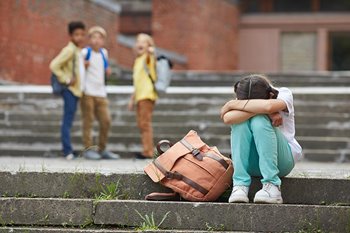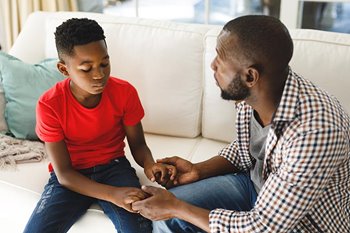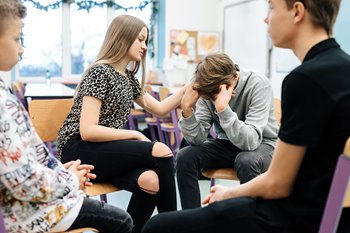 Starting the school year is exciting for many kids, but for some kids, the start of the school year can also trigger anxiety and fear. If they've dealt with bullying in the past, going back to school can mean going back to face humiliation again.
Starting the school year is exciting for many kids, but for some kids, the start of the school year can also trigger anxiety and fear. If they've dealt with bullying in the past, going back to school can mean going back to face humiliation again.
Here, we will explore what bullying is, signs that your child is being bullied or that they are bullying, and how best to prevent or stop it.
Bullying, defined.
According to the American Psychological Association, bullying is defined as, "a form of aggressive behavior in which someone intentionally and repeatedly causes another person injury or discomfort."
The Mayo Clinic identifies four forms of bullying:
- Physical: This type of bullying includes hitting, tripping and kicking, as well as destruction of a child's property.
- Verbal: Verbal bullying includes teasing, name-calling, taunting and making inappropriate sexual comments.
- Psychological or social: This type of bullying involves spreading rumors about a child, embarrassing the child in public or excluding the child from a group.
- Electronic: Cyberbullying involves threatening or harming others through the use of email, websites, social media platforms, text messages, or videos and photos shared electronically.
Bullying often has to do with a power imbalance. According to a recent survey, students ages 12–18 who reported being bullied (about 18% in Wisconsin) said they thought those who bullied them:
- Had the ability to influence other students' perception of them (56%).
- Had more social influence (50%).
- Were physically stronger or larger (40%).
- Had more money (31%).
If we don't see it, how do we know it's happening?
 Most adults have either experienced bullying themselves, or witnessed it at some point in their lives. When it's right in front of you, it's easy to identify. But what if it's not?
Most adults have either experienced bullying themselves, or witnessed it at some point in their lives. When it's right in front of you, it's easy to identify. But what if it's not?
Kids who are being bullied may struggle to talk about it, or bring it up. Being bullied can make a child feel helpless, or as though bringing it up will make them a tattletale. Their bully may be saying humiliating things that they don't want anyone else (especially adults) to hear, or they may be afraid of additional backlash from their bully.
It's no surprise that bullying has a number of negative effects from depression and anxiety to self harm and even suicide. For these reasons, it's important to watch out for warning signs that your child might be experiencing bullying:
- Unexplainable injuries
- Lost or destroyed clothing, books, electronics, or jewelry
- Frequent headaches or stomach aches, feeling sick or faking illness
- Changes in eating habits, like suddenly skipping meals or binge eating (kids may come home from school hungry because they did not eat lunch)
- Difficulty sleeping or frequent nightmares
- Declining grades, loss of interest in schoolwork, or not wanting to go to school
- Sudden loss of friends or avoidance of social situations
- Feelings of helplessness or decreased self esteem
- Self-destructive behaviors such as running away from home, harming themselves, or talking about suicide (if your child is talking about suicide, dial 988, the suicide and crisis hotline.)
Watching for signs that your child is experiencing bullying is only one side of the coin. How do you know if your child is the bully? If you see your child exhibiting any of these behaviors, it may be time to dig a little deeper:
- Getting into physical or verbal fights with their peers
- Hanging out with kids who bully others
- Increasing aggression
- Acquiring unexplained extra money or new belongings
- Refusing to accept responsibility for their actions/blaming others
- Being competitive and worrying about their reputation or popularity
Unfortunately, changes in behavior do not automatically mean that a child is being bullied or is bullying others, and some kids may not exhibit any signs at all. This is where parents, caregivers, teachers and coaches need to come together to create a culture of communication, kindness and accountability.
Preventing bullying
 As a parent or caregiver, preventing bullying is the best option. This needs to start early on in a child's life with open lines of communication, modeling kindness and respect, and teaching kids about bullying. According to Barb Johnson-Giese, Behavioral Health Manager at Door County Medical Center (DCMC), "If you want your child to talk to you, you need to teach them who to do so by talking to them. Children who are regularly expected to share details of their lives with parents are more comfortable continuing to share what they are doing in adolescence."
As a parent or caregiver, preventing bullying is the best option. This needs to start early on in a child's life with open lines of communication, modeling kindness and respect, and teaching kids about bullying. According to Barb Johnson-Giese, Behavioral Health Manager at Door County Medical Center (DCMC), "If you want your child to talk to you, you need to teach them who to do so by talking to them. Children who are regularly expected to share details of their lives with parents are more comfortable continuing to share what they are doing in adolescence."
No one knows your child better than you do, but as kids develop into teenagers, it can be a struggle to keep the lines of communication open. This can be as simple as establishing some habits of your own as a parent or caregiver:
-
Ask your child questions about their experience every day. Instead of just, "How was your day," try asking more specific questions like, "Who did you sit with at lunch today?" to help you get a glimpse into their world.
-
When they do open up, make it a habit to stop what you are doing and actively listen to them. Even if it doesn't seem important at the time, that small act lets them know that you are there for them through thick and thin and will make them more likely to come to you when things get tough.
-
Stay engaged in their school life - read the school newsletter, stay in touch with other parents and attend school events.
Additionally, encourage your kids to take part in activities they like. Kids can volunteer, play sports, join a choir or band, or explore different youth groups or school clubs. Interests outside of school help build confidence, provide emotional release and help them develop friendships with other kids with similar interests.
In Door County schools, STRIDE is an excellent resource for helping kids with mental health through counseling and art therapy.
Bullying has started - what do we do now?
If you know someone in serious distress or danger, don't ignore the problem. Get help right away. You can start with the resources available through www.stopbullying.gov.
Responding quickly to bullying behavior is the first vital step. If you witness bullying first hand, intervene immediately and separate the kids involved. Get another adult involved and try to sort out the facts from each party separately. If weapons, crime, violence or threats of violence are involved, get help from police. If there is any sexual assault or bodily harm, also involve medical professionals right away.
If you discover bullying behavior second-hand, speak with teachers, principals, other school representatives and even parents of the other parties involved to come up with a plan.
Most importantly, kids who are experiencing bullying AND those that are bullying others need support. Consider seeking help from a counselor or therapist.
Make sure that the child being bullied feels safe, that their routines are not disrupted and that they are not singled out.
The child who is bullying others must learn that their behavior is wrong. Recognize that their behavior is likely a symptom of another issue that may be causing low self-esteem and they could benefit from some kind of therapy or counseling.
Johnson-Giese adds, "Kids who bully others are not 'bad kids.' They may be looking for attention, and haven't been successful getting it in other ways. They may be bullied at home or school, and are trying to establish a sense of control by being aggressive towards others."
 They can be supported in taking accountability for their actions by apologizing, and they can be encouraged to learn more about the damage bullying does and the reasons kids might bully others by being assigned a report or presentation on the topic.
They can be supported in taking accountability for their actions by apologizing, and they can be encouraged to learn more about the damage bullying does and the reasons kids might bully others by being assigned a report or presentation on the topic.
Bullying is a serious issue, and the good news is that kids who exhibit bullying behavior can change.Just like the children who experience bullying, it is possible to heal if they have the support they need.
Additional resources
In addition to www.stopbullying.gov, there are other local resources available to help address the effects of bullying:
-
Door County Medical Center Behavioral Health Services sees patients five years-old and up. (920) 746-0510 www.dcmedical.org/MedicalServices/Behavioral-Health-and-Psychotherapy
-
Door County Department of Health & Human Services Children and Families Division includes a comprehensive family support services team providing a host of services to children, youth, and families. (920) 746-7155 www.co.door.wi.gov
-
Suicide and Crisis Intervention Hotline: (920) 746-2588 or 988